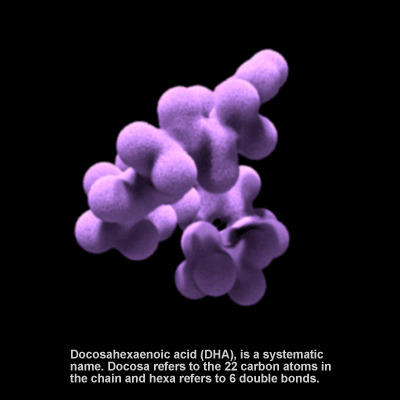Most of the fats found in food are triglycerides, cholesterol, and phospholipids. Some dietary fat is necessary for the absorption of fat-soluble vitamins (A, D, E, and K) and carotenoids. Humans and other mammals require fatty acids such as linoleic acid (an omega-6 fatty acid) and alpha-linolenic acid (an omega-3 fatty acid), because they cannot be synthesized from simple precursors in the diet.
Both omega-6 and omega-3 are 18-carbon polyunsaturated fatty acids that differ in the number and position of their double bonds. Most vegetable oils (safflower, sunflower, and corn oils) are rich in linoleic acid. Alpha-linolenic acid is found in the green leaves of plants, selected seeds, nuts, and legumes, and particularly in flax, rapeseed, walnut, and soy. Fish oils are especially rich in the longer-chain omega-3 fatty acids eicosapentaenoic acid (EPA) and docosahexaenoic acid (DHA) . Numerous studies have shown that the consumption of omega-3 fatty acids has positive benefits in terms of infant development, cancer, cardiovascular disease, and mental illnesses such as depression, attention-deficit hyperactivity disorder, and dementia. In contrast, the consumption of trans fats, such as those present in partially hydrogenated vegetable oils, are now known to be a risk factor for cardiovascular disease.

Omega-3 Fatty Acid
Docosahexaenoic acid (DHA) is an omega-3 fatty acid. It is essential for proper functioning of the brain in both adults and infants. DHA concentrations in breast milk range from 0.07-1.0% of total fatty acids and are influenced by the amount of fatty fish in the mother's diet. In the U.S., infant formula has been supplemented with DHA since 2001. Research suggests that DHA contributes to numerous nervous system functions such as visual acuity, neurogenesis, and synaptogenesis, and that it lowers the risk for cardiovascular disease. It is highly concentrated in the brain and eye.
Several studies have suggested that total dietary fat intake is linked to obesity and diabetes. However, influential studies like the Women's Health Initiative Dietary Modification Trial (an eight-year study of 49,000 women), as well as the Nurses' Health Study and the Health Professionals Follow-up Study, have revealed no such link between percentage of calories from fat and risk of cancer, heart disease, or weight gain. The Nutrition Source, a website maintained by the Department of Nutrition at the Harvard School of Public Health, summarizes the current evidence on the impact of dietary fat as follows: "Detailed research—much of it done at Harvard—shows that the total amount of fat in the diet isn't really linked with weight or disease. "

Salmon
Salmon is an excellent source of omega-3 fatty acids.